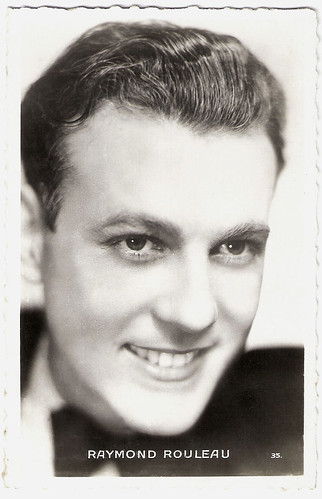
French postcard by Ed. Chantal, Paris, no. 35.
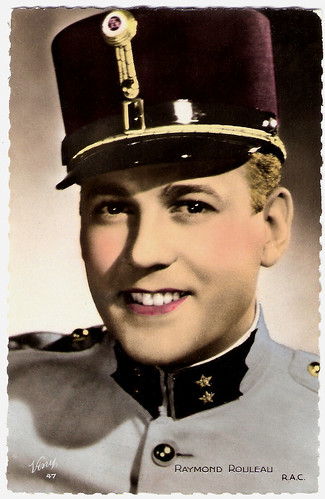
French postcard by Viny, no. 47. Photo: R.A.C. Raymond Rouleau in Coups de feu/Gunshot (René Barberis, 1939).

French postcard by S.E.R.P., Paris, no. 77. Photo: Studio Harcourt.
Who Killed Santa Claus?
Raymond Rouleau was born Edgar Rouleau in Brussels, Belgium in 1904. After studying at the Conservatoire Royal de Bruxelles (the Royal Conservatory of Brussels), he moved to Paris and worked there with Antonin Artaud and Charles Dullin.
In 1928, he turned to the cinema and appeared in the silent classic L'argent/The money (Marcel L’Herbier, 1928) starring Brigitte Helm. James Travers at French Film Guide: “At a cost of nearly five million francs, L'Argent was Marcel L'Herbier's most lavish and greatest film. Based on a novel of the same name by Emile Zola, but updated to contemporary France, the film makes an unveiled condemnation on the world of high finance, particularly the sin of speculation, the thing L'Herbier hated above all else. Thanks to its modern setting and simple story of greed and corruption, the film is just as relevant today as it was in the late 1920s.”
After more small roles, Rouleau played the male lead in La femme nue/The naked woman (Jean-Paul Paulin, 1933) opposite Florelle. He directed the drama Une vie perdue/Journal of a Crime (Raymond Rouleau, 1933). He co-starred with Simone Simon and Jean-Pierre Aumont in the romantic Les beaux jours/Happy days (Marc Allégret, 1935).
In 1937, he starred opposite Louis Jouvet in the French drama Le drame de Shanghaï/The Shanghai Drama (Georg Wilhelm Pabst, 1938), an ambitious mix of film noir, melodrama, and reportage set against the backdrop of the Chinese Civil War of the 1930s. He also appeared in the disturbing melodrama Conflit/Conflict (Léonide Moguy, 1938), starring Corinne Luchaire and Annie Ducaux as two sisters.
On 24 May 1940, he volunteered in the army and was assigned to Sanitary Sections of the front on 30 May. He was a war prisoner in July, August, and September 1940. Later he was honoured with the Croix de Guerre and the Medal of Volunteer Workers.
He appeared again in films like the romantic comedy Premier bal/First Ball (Christian-Jaque, 1941) with Marie Déa, and L'assassinat du Père Noël/Who Killed Santa Claus? (Roger Chapatte, Christian-Jaque, 1941) starring Harry Baur. At French Film Guide, James Travers writes: “With its claustrophobic account of a close-knit community being torn apart by fear, suspicion and malicious denunciations, L'Assassinat du Père Noël has much in common with Henri-Georges Clouzot's Le Corbeau (1943). The plots may differ but the two films powerfully evoke the mood of the time in which they were made, conveying the sense of mistrust and paranoia that was widely felt in France during the Occupation.”
In 1942, Rouleau co-founded with Jean-Louis Barrault and Julien Bertheau l'École du Comédien (the School of comedians), which existed till 1944. From 1944 to 1951, he headed the Théâtre de l'Oeuvre with Lucien Beer.
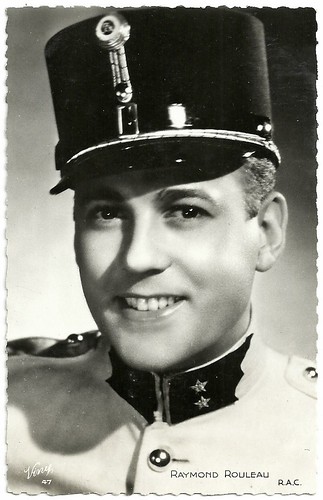
French postcard by Viny, no. 47. Photo: R.A.C. Raymond Rouleau in Coups de feu/Gunshot (René Barberis, 1939).
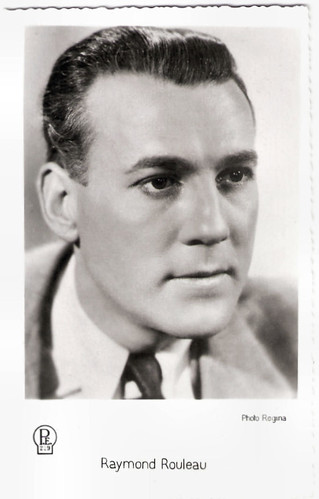
Belgian postcard by P.E. (Photo Edition), Bruxelles, no. 239. Photo: Regina.
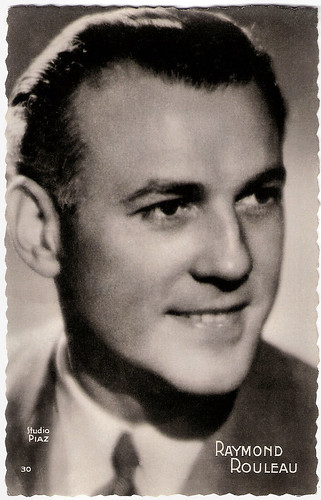
French postcard by Editions O.P., Paris, no. 30. Photo: Studio Piaz.

French postcard, no. 77. Photo: Films Orange.
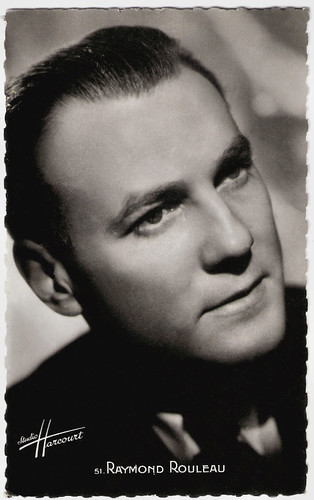
French postcard by S.E.R.P., Paris, no. 51. Photo: Studio Harcourt.
An actor who required
After the war, Raymond Rouleau continued to star in films like Falbalas/Paris Frills (Jacques Becker, 1945) with Micheline Presle, and Dernier refuge/Last Refuge (Marc Maurette, 1947) with Gisèle Pascal and based on Georges Siménon’s Le Locataire.
In 1949, he played reporter Georges Mass in Mission à Tanger/Mission in Tangier (André Hunebelle, 1949), which was the first film scripted by Michel Audiard. He worked again with director André Hunebelle at Méfiez-vous des blondes/Beware of blondes (André Hunebelle, 1950) and Massacre en dentelles/Massacre in lace (André Hunebelle, 1951). According to Michel Audiard, Raymond Rouleau was an actor who 'did not discuss, but who required!'
He starred opposite Jeanne Moreau in the French film noir Les Intrigantes/The Plotters (Henri Decoin, 1954). As a director, he made Les Sorcières de Salem/The Crucible (Raymond Rouleau, 1957) with Simone Signoret, Yves Montand and Mylène Démongeot. The screenplay was adapted by Jean-Paul Sartre from the play The Crucible, by Arthur Miller.
In 1958, he founded the Nouveau Cartel (New Cartel) with André Barsacq, Jean Mercure and Jean-Louis Barrault.
Later he directed the musical Les Amants de Teruel/The Lovers of Teruel (Raymond Rouleau, 1962) with Ludmilla Tchérina, which was entered into the 1962 Cannes Film Festival. Eleanor Mannika at AllMovie: “This puzzling experimental film is written and directed by Raymond Rouleau, who uses effects like changing color tones and masks to put across a drama within a dance drama. The set is a sound stage and the actors in this film are dancers on the stage, performing a mime-ballet derived from one particular legend.”
In 1973, he made Vogue la galère (Raymond Rouleau, 1973) with Claude Dauphin and Robert Hossein. His final film as an actor was the TV film Le destin de Priscilla Davies/The fate of Priscilla Davies (Raymond Rouleau, 1979), adapted by Rouleau from a short story by Henry James.
In 1981, Raymond Rouleau passed away in Paris, at the age of 77. He was married to the actresses Tania Balachova, Françoise Lugagne and Françoise Cremieux. He is the father of Philippe Rouleau and Fabrice Rouleau, from his marriage to Françoise Lugagne.
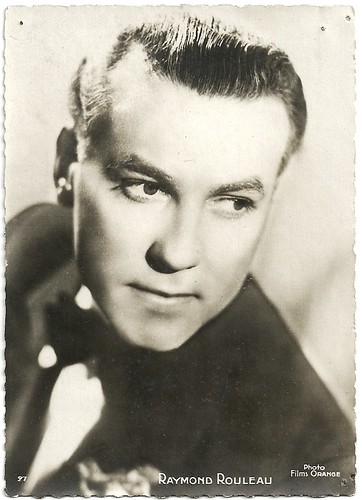
French postcard, no. 27. Photo: Films Orange.
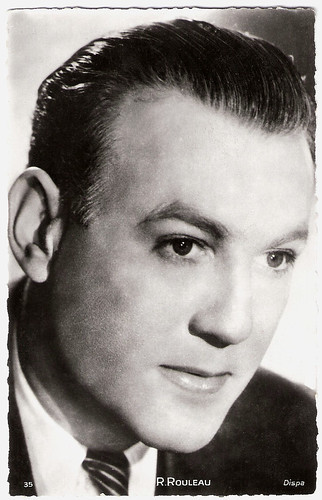
French postcard, no. 35. Photo: Dispa.
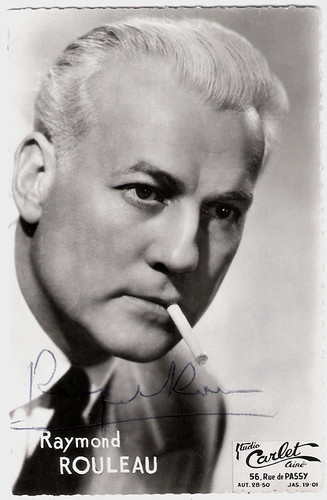
French autograph card. Photo: Studio Carlet Ainé, Paris.
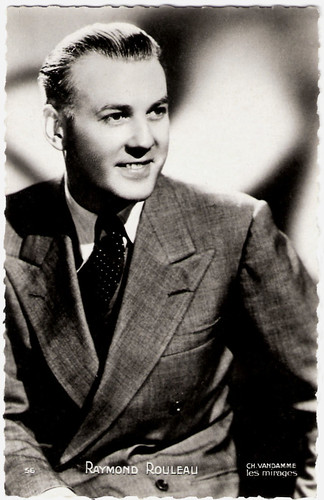
French postcard, no. 57. Photo: Ch. Vandamme / Les Mirages.
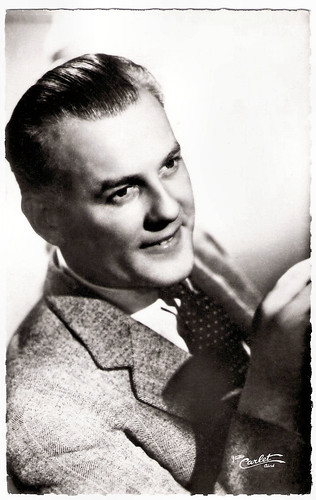
French postcard by Editions du Globe, no. 63. Photo: Carlet, Ainé.
Sources: James Travers (French Films Site), Eleanor Mannikka (AllMovie), Wikipedia (French and English), and IMDb.
This post was last updated on 8 July 2021.
No comments:
Post a Comment